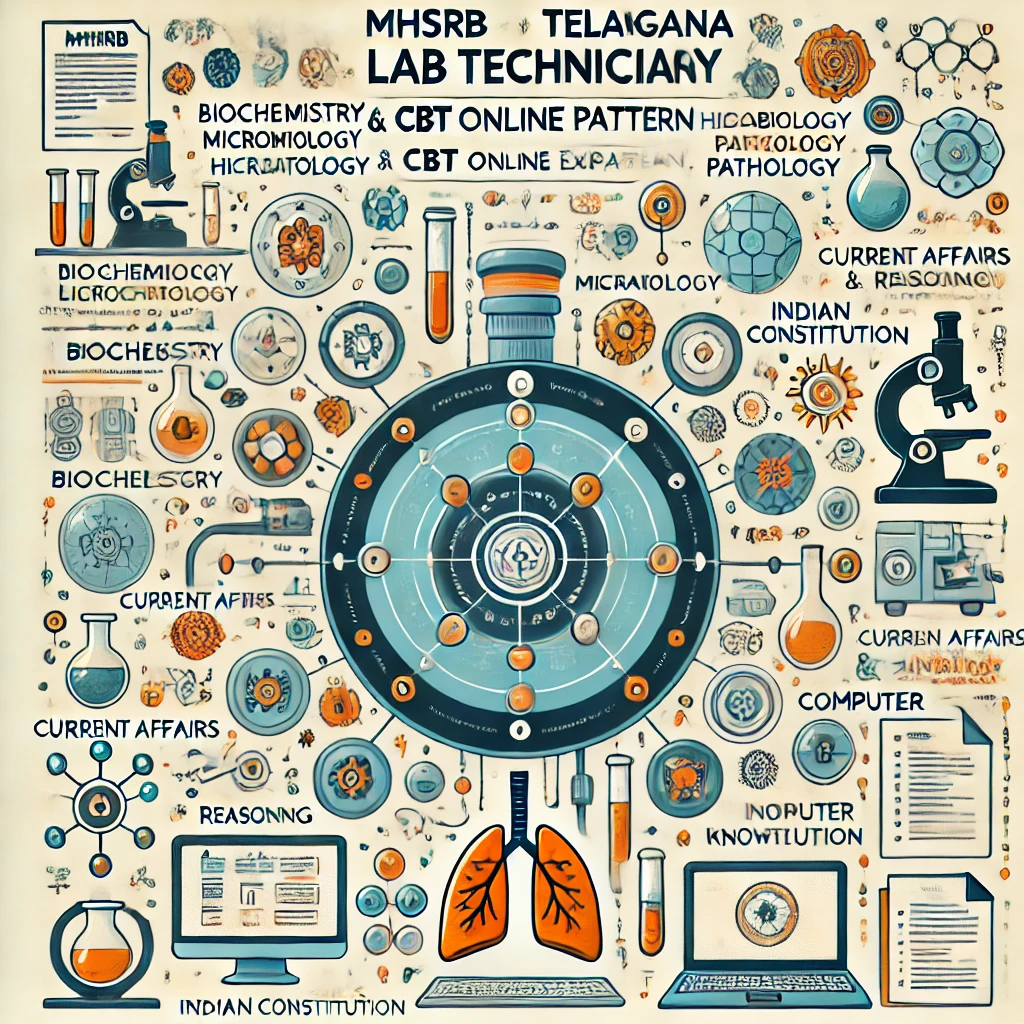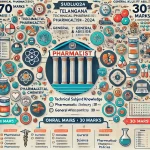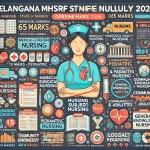Medical Health Services Recruitment Board (MHSRB) of Telangana State is the responsible authority for recruiting lab technicians in various government sponsored hospitals and medical institutes.
The MHSRB will soon going to conduct an online Computer-Based Test (CBT) on 1284 posts of lab technician to assess applicants knowledge in laboratory skills. Check out MHSRB Telangana Lab Technician syllabus and CBT exam pattern to prepare effectively for this recruitment exam.

Contents
MHSRB Telangana Lab Technician Recruitment
The recruitment process is divided into multiple phases, with the Computer-Based Test (CBT) playing a central role. Understanding the syllabus and exam pattern is essential for candidates aspiring to secure this post. Let’s explore the details.
| Conducted By | Telangana State Medical & Health Services Recruitment Board |
| Name of Post | Laboratory Technician (Grade-II) |
| No of Vacancies | 1284 Posts |
| Category | Syllabus & Pattern |
| Notification No. | 03/2024, DATED: 11.9.2024 |
| Salary | Rs 32,810 – 96,890/- |
| CBT Exam Date | 10 November 2024 |
| Selection Process | Written Test & Document Verification |
| Exam Type | Computer Based Test (MCQ-CBT) |
| Official Website | mhsrb.telangana.gov.in/MHSRB/home.htm |
MHSRB Telangana Lab Technician Exam Pattern
The exam pattern provides a clear structure of the questions, marks distribution, and overall duration of the test. Here’s a breakdown:
- Mode of Examination: The exam is conducted in an online (CBT) format.
- Number of Questions: There will be 80 questions in the online written test.
- Question Type: All questions are multiple-choice (MCQs).
- Total Marks: The CBT exam has maximum 80 marks.
- Duration: The duration of the online exam is 90 minutes.
- Marking Scheme: Each correct answer is awarded 1 mark, and there will be no negative marking (not mentioned in notification).
- Subject Covered: Technical Subject Knowledge: Focuses on lab-related topics.
- Question Paper Language: English
- Merit Weightage: 80% Online written test and 20% Experience.
| Subject | Questions/Points | Max Marks/Points |
| Laboratory Technician Subjects (Diploma Level) | 80 | 80 |
| Work Experience (state government hospitals/ institutions/ programmes on contract/outsourced basis) | 20 | 20 |
| TOTAL | 100 | 100 |
Telangana Lab Technician Syllabus 2024
CLINICAL BIOCHEMISTRY
Unit-I. GENERAL TOPICS
- Laboratory Services:-Levels of laboratories – primary level, secondary level & tertiary level, Reference laboratories.
- Infrastructure in the laboratories. a) Laboratory space: Reception, specimen collection, quality water supply, power supply, work area, specimen /sample /slide storage, cold storage, record room, fire safety, b) Personnel in the laboratory – Qualifications as per NABL document. c) Equipment – Listing, cleaning, maintenance, SOP, verification of performance, Internal quality control. d) Instruments:- Theoretical basis, uses, different parts, installation of instruments – calorimeters, spectrophotometers, balances, centrifuges, refrigerators, hot air ovens, water baths, thermometers, vortex mixers, magnetic stirrers, UV lamp, spectroscopes. e) Reagents & Materials- Purchase, maintenance, storage and use.
- Specimen collection, storage & Transport:- a) General guidelines of sample collection, labelling, handling, transportation, storage of specimen. Care in handling specimens. Pre-analytical considerations including patient preparation. b) IP/OP Nos and LAB. Nos, worksheets, reporting test results, specimen rejection record, recording of laboratory data, maintenance of records. c) Types and mechanisms of action of various anticoagulants and preservatives used. d) Serum and plasma preparations. Preparation of Protein Free Filtrate. Sample stability.
- Water, chemicals, solutions and reagents:- a) Types of water. Characteristics and principles of preparation of distilled and deionised water – distillation apparatus and deioniser b) Chemicals – different grades of chemicals and their significance c) Solutions – definition and preparation of percent, normal, molar & molal solutions d) Concept of standard solutions – principles of preparation of standard solutions – primary & Secondary standards.
Unit-II
- Units of measurement – different systems followed & their inter-conversions
- Colorimetry – principles- complete understanding of percent transmittance, absorbance, & Beer Lambert’s law. Concept of using blank, standard and test (B,S&T). Mathematical calculation of quantity of an analyte through formulation of general formula.
- Electrochemistry:- basic principles and applications of potentiometry. Ion selective electrodes.
- Accidents and Emergencies & first-aid in the laboratory.
- Bio- waste Management.
- Automation:- basic principles, different components and general principles of usage applications
- Ethical considerations:- transmission of ethical values, voluntariness, compliance.
- Computers:- basic theoretical knowledge and usage of computers in clinical biochemistry laboratory.
- Quality assurance :- Standard Operating Procedures (SOPs) – definition ,format,
- Internal and external quality assessment –Introduction.
Unit-III: Biochemistry:-
- Chemistry of carbohydrates and reactions of glucose. Carbohydrate metabolism, glycolysis, citric acid cycle, HMP shunt, oral glucose tolerance test in normal and diabetes mellitus, Ketone bodies.
- Chemistry of lipids and lipoproteins, Chemistry and metabolism of proteins –ammonia metabolism, urea cycle, Chemistry of nucleic acids- Structure of DNA, RNA, ATP, GTP, UTP., Non protein nitrogen substances (NPN) – urea, Creatinine, uric acid., Digestion and absorption of carbohydrates, lipids and proteins, Vitamins and minerals
Unit-IV: Clinical Biochemistry
- Acids, bases & salts:- Concepts of hydrogen ion concentration. pH & pH meter.
- Plasma proteins – fractionation techniques, interpretation.
- Bilirubin :- Outlines of formation and excretion. Conjugated and unconjugated bilirubin and its clinical applications. Jaundice.
- Urine:- Formation and characteristics of normal urine. Abnormal constituents. Urine analysis and interpretation. Spot urinary protein, 24 hours urinary protein.
- Renal clearance tests ; & Total Protein & A:G ratio, Blood urea, S. Creatinine, BUN.
- Body fluids:- Outlines of formation, composition and analysis of bodyfluids like cerebrospinal fluid, pleural fluid, & peritoneal fluid and interpretation of the results.
- Glucose tolerance test :- Concepts of tolerance tests. Definition, patient preparation, performance, reporting and interpretation of GTT.
- Blood coagulation:- basic knowledge. Principles of estimation of plasma fibrinogen and prothrombin time, APTT.
- Lipids & Lipoproteins:- triglycerides, cholesterol, phospholipids. Serum lipoprotein – patterns in health and disease.
- Enzymes& Isoenzymes – LDH, CPK, GGT,SGOT, SGPT
- Hormones – analysis of 17-keto steroids and VMA.
- Inorganic-ions:- Concepts; – Bicarbonates, phosphates, calcium, sodium, Potassium,
- Blood gases Analysis:- Bicarbonate buffering system, Henderson- Hasselbach reaction, blood pH, pO2, pCO2, HCO3 ̄ calculations; nomograms
Unit-V: Demonstration topics
- a) liver function tests
- b) gastric analysis
- c) Renal function tests
- d) Radio-isotopic techniques
- e) Calculi formation and analysis
- f) Thyroid function tests
- g) Electrophoresis.
II. CLINICAL MICROBIOLOGY
Unit-I: General microbiology:-
- Knowledge of various samples and procedures of collection for microscopy, serology & culture; Procedures of accepting/rejecting samples for cultures; Procedures of labeling, registering, transport & storage of various specimens;
- Procedures of laboratory work- safety and laboratory maintenance- Knowledge and expertise in working under conditions of biological hazard (BSL 1, 2, 3); Procedure of handling exposure to various infectious agents; Biomedical waste management;
- Maintenance of laboratory equipment; Culture methods for different bacteria & fungi – Media preparation; Methods of inoculation; Disposal of used media & specimens; Sterilization & Disinfection- Laboratory; Operation theatres.
Unit-II: Bacteriology
- Characterisation of aerobic and anaerobic bacteria – Differences between aerobic and anaerobic; Gram’s staining method-Reagents preparation; Alberts stainig-Reagents preparation; AFB staining-Reagents preparation;
- Characterization of Gram positive bacteria-cocci-Staphylococcus & streptococcus-bacilli-Mycobacteria, Clostridia & Corynebacterium; Gram negative bacteria-E.coli, Klebsiella, Proteus, Salmonella, Shigella, Vibrio, Pseudomonas; Principles of bacterial identification-staining, culture, spot tests, Commercial kits.
Unit-III: Mycology & Parasitology
- Knowledge of common pathogenic fungi-differences between yeasts and moulds; Fungal media preparation, pH adjustment, preservation of media & samples, preparation of reagents-KOH, germ tube test, spot tests.
- Knowledge of various parasites and diseases caused by them; life cycles, morphology, hosts, vector, animal reservoir, epidemiology, parasite – host relationships, diagnosis and treatment – E.hystolytica, Giardia, Cryptosporidium, Ascaris, Echinococcosis, Schistosoma, Toxoplasma;
- Blood parasites – plasmodium, microfilaria; Light microscopy, reagent preparation, staining methods; Normal saline & Lugol iodine mounts ; Serological methods for parasite detection, identification of antigens in blood, feces and urine.
Unit-IV: Virology
- Knowledge of medically important viruses; General laboratory tests for viral detection; Viral serology & ELISA; Tests based on Immunochromatography; Maintenance of viral laboratory.
Unit-V: Automation in Microbial Identification - Automation in bacteriology-Blood culture systems; Methods of antimicrobial sensitivity tests- Disk Diffusion Test (Kirby Bauer) – MIC- E test; Principle of action of antibiotic agents; Detection of multi drug resistant (MDR) bacteria- ESBL, MRSA, VRE, Mycobacterium; Serological tests for antigen & antibody detection.
III. PATHOLOGY
Unit-I: Clinical Pathology:- Urine collection, physical & chemical examination; Sugars, proteins, ketone bodies, Bence-Jones proteins, bile, blood in urine; Microscopic examination – formed elements; Casts, crystals, parasites, abnormal cells; Other body fluids- types, names, physical & chemical examination; Semen analysis- physical, chemical and microscopic examination.
Unit-II: Haematology
- Knowledge about RBCs, WBC, platelets and any abnormal cells; Haemoglobin estimation, red cell indices, haematocrit, ESR; Total cell counts- WBC, RBC, platelets, AEC; LE cell test
- Coagulation related tests; Haemoparasites, bone marrow slide preparation; Cell coulter operation.
Unit-III: Histopathology:- Knowledge of material and equipment used; Collection, preservation and labelling of samples; Grossing methods, fixatives used and processing of tissue including bone tissue from collection to slide making; Special stains and immuno-histochemistry; Staining procedures; Preservation of specimen, blocks, reports; Mounting of museum specimens.
Unit-IV: Cytology and General Pathology:-
- Different types of techniques and equipment used to obtain materials including various guided; methods- FNAC, imprint smear. Vaginal smear, buccal smear, cytospin cytosmears;
- Various staining methods, Different reagents used in Pathology; Preparation of fluids for cytological examination; Transport of specimen Preservation of samples., reports, records. Disposal of waste (infected materials)
Unit-V: Immuno-Haematology:- Material and methods used in Blood banking; Blood grouping techniques, ABO system and Rh system; Donor’s selection; Storage and processing of blood bags; Blood bags- grouping, quality control test and labelling; Direct and indirect Coombs test, antibody titers; Problems in blood grouping and cross matching.
Important Dates
| Online Application Form Available From | 21 September 2024 |
| Last Date To Apply Online | 05 October 2024 |
| Edit/Correction In Application Form | 07 to 08 October 2024 |
| Staff Nurse CBT Exam Date | 10 November 2024 |
| Admit Card Available From | 1st Week of November 2025 |
Important Links
- Must See:- Telangana MHSRB Staff Nurse Syllabus 2024 & Online CBT Exam Pattern
- Must See: Telangana MHSRB Pharmacist Syllabus 2024 & Online CBT Exam Pattern
- Telangana Recruitment Updates & Notifications:- https://4syllabus.in/tag/telangana/
- For Official Lab Technician (Grade-II) Notification (Advertisement): CLICK HERE
- Official Telangana MHSRB Website: https://mhsrb.telangana.gov.in/MHSRB/home.htm
MHSRB Telangana Lab Technician exam is an important step for candidates aspiring to serve in the medical and healthcare sector. Understanding the exam pattern and syllabus, candidates can create a focused study plan and boost their chances of success as a lab technician. Best of Luck.
Important Faqs
Is there negative marking in the MHSRB Lab Technician exam?
Not mentioned in notification, so assume no negative marking or confirm by yourself.
Where can I find the official syllabus for the MHSRB Lab Technician exam?
You can check official syllabus in notification. Check notification in important links section.
What are the main sections in the syllabus?
Covers core topics such as Clinical Biochemistry, Microbiology, Hematology, Pathology, Immunology, and Laboratory Technology.

